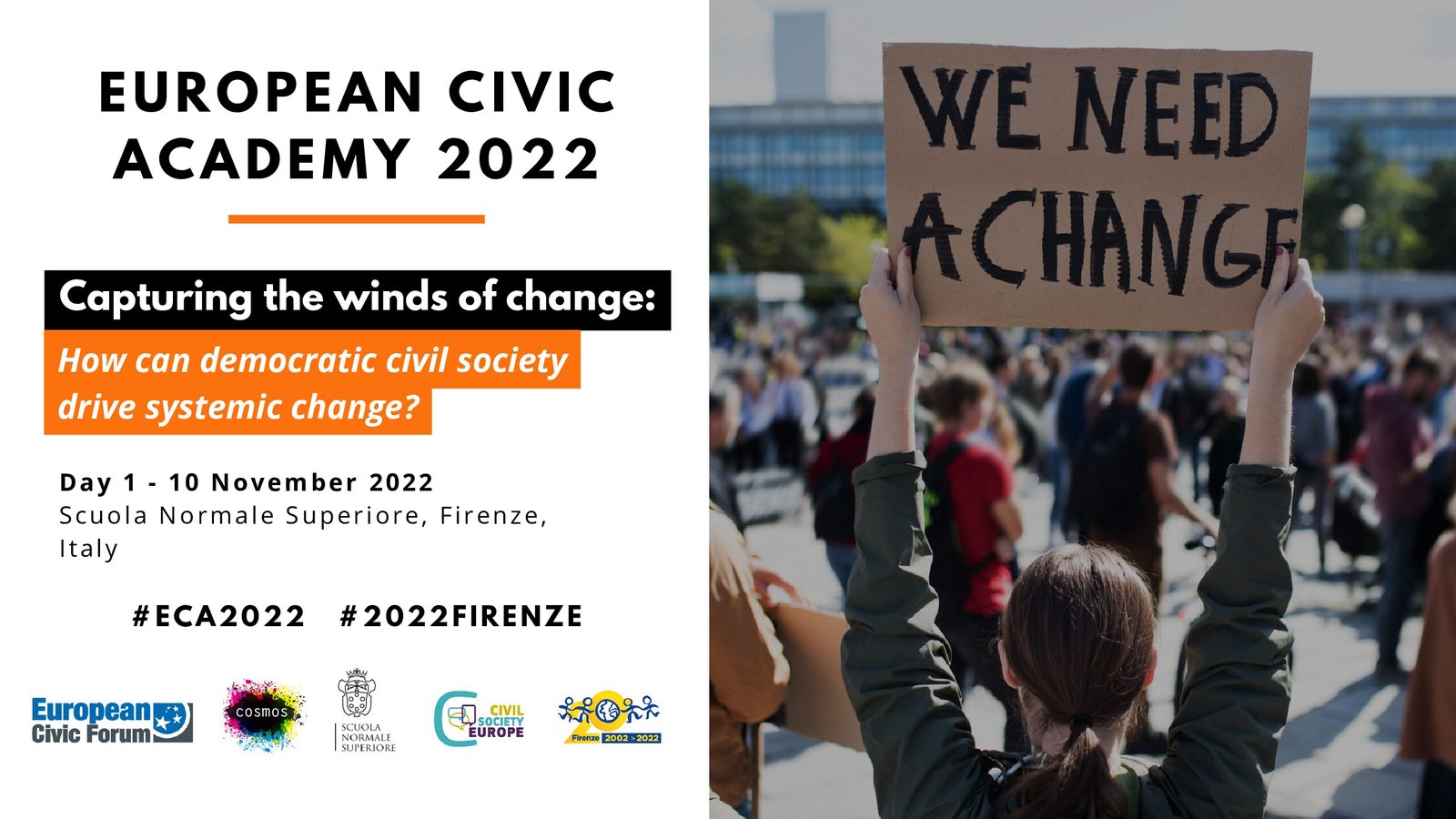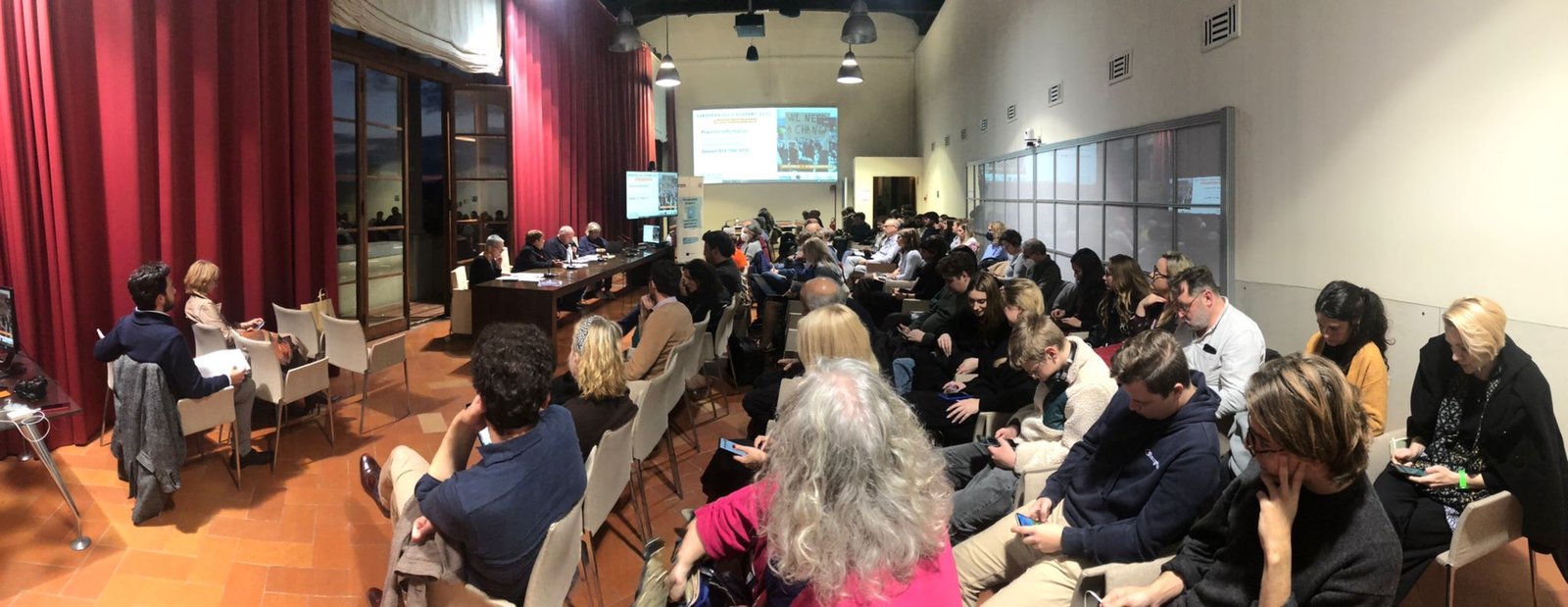
European Civic Academy 2022 – Capturing the Winds of Change
On 10-11 November, academics, civil society representatives and activists gathered in Florence to attend the fifth European Civic Academy. This year’s event was held on the theme “Capturing the winds of change: how can democratic civil society drive systemic change?”
Large-scale crises have repeatedly affected Europe and the world in recent decades, with the Covid-19 pandemic, the war in Ukraine and the energy crisis the most recent examples. These multifaceted crises showcase the systemic nature of the challenges we face today: climate change and the related natural and humanitarian disasters, social injustice and rising inequalities, and the long-term consequences of conflicts.
How can we be resilient when we experience many defeats? What are the factors that can support the creation of progressive change in society and in policymaking? What lessons can we learn from civil society’s successes? These are just some of the questions explored at ECA 2022.
Then and now: 20 years since the European Social Forum
 European Civic Academy 2022 took place in the framework of 2022Firenze – a programme of events and a large gathering civil society from across Europe. The event was held to mark 20 years since the first European Social Forum was held back in 2002. It was fitting, therefore, that the European Civic Academy kicked off with a session reflecting on the events two decades earlier.
European Civic Academy 2022 took place in the framework of 2022Firenze – a programme of events and a large gathering civil society from across Europe. The event was held to mark 20 years since the first European Social Forum was held back in 2002. It was fitting, therefore, that the European Civic Academy kicked off with a session reflecting on the events two decades earlier.
 ECF Co-President Raffaella Bolini was a member of the promoter committee at the 2002 European Social Forum, while Lorenzo Zamponi, Research Fellow at the Centre on Social Movement Studies, was a young activist at the event. For this opening session, they were interviewed by Filip Pazderski, Vice-President at ECF.
ECF Co-President Raffaella Bolini was a member of the promoter committee at the 2002 European Social Forum, while Lorenzo Zamponi, Research Fellow at the Centre on Social Movement Studies, was a young activist at the event. For this opening session, they were interviewed by Filip Pazderski, Vice-President at ECF.
The session covered a wide range of topics – from how the alter-globalisation movement was born, to how the climate emergency makes patience in activism more difficult, to how the anti-war movement today can overcome differences of opinion about how to provide solidarity to Ukraine.
Wrapping up, Bolini delivered a message to activists in the audience: “our only strength is the capability to converge and create unity… all the evidence of successful change from below is when people have united.”
Art of Fundamental Rights

After the opening session, participants attended a dinner to congratulate the laureates of the Civic Pride Awards.
This took place alongside the opening of Art of Fundamental Rights, an exhibition curated by Nyt Europa, using art to inspire broader public engagement in debates about fundamental rights.
It consists of seven works of art from professional artists from across Europe, each of whom interprets the EU Charter of Fundamental Rights through different art forms.
Civil Society’s Recent Success Cases
Day 2 kicked off with a keynote speech from Professor Donatella della Porta, Director of the Centre on Social Movement Studies.
to explore some of the topics raised in the event’s discussion paper, including:
- How can we conceive of “victories” in a way that takes into account the non-linear path of progressive change, including setbacks and defeats?
- What skills, capacities, resources, and infrastructures does civil society need to achieve its goals in a coherent manner?

The speech was followed by a broad roundtable discussion moderated by ECF Secretary General Alexandrina Najmowicz. Focusing in on the themes explored by Professor della Porta, the panel included Anika Jane Dorothy, fellow on the Young Africa Leaders Programme at the European University Institute, Laura Sullivan, Executive Director of We Move Europe, Kalypso Nicolaidis, Chair in Global Affairs at the EUI’s School of Transnational Governance; Christophe Aguiton, sociologist and founding members of Attac, and Janmejai Tiwari, Secretary General of the Global Young Greens. After the panel, participants split up into three groups to focus in collaboratively on key questions. Stay tuned to hear more about these discussions!
Precarity, populism and the future of progressive alternatives
The afternoon was opened by Albena Azmanova, Professor at the Brussels School of International Studies at the University of Kent, who delivered a keynote speech entitled “Precarity, populism and the future of progressive alternatives.”
“Of late,” she began, “our societies and our activism have been crippled by a new scourge: that of massive precarity – vulnerability rooted in the insecurity of livelihoods.” Professor Azmanova went on to outline the origins of this new precarity, how it has helped embolden “populist” and far-right movements and set out seven ideas about how democratic civil society can drive systemic change. Read her full speech!
After Professor Azmanova’s speech, participants once again split up into three groups to focus in collaboratively on key questions.
Side event: Rethinking alter-globalisation – the rise of planetary politics?
After the event wrapped up, the European University Institute’s Democracy Forum, in collaboration with the European Civic Forum and Citizens Take Over Europe, held a side-event looking back on the European Social Forum in Florence back in 2002. The discussion focused on key questions including:
- What are the ideas and frames we need to uphold from the alter-globalisation agenda?
- What lessons should we draw from the history of political organising in Europe and beyond, notably these last 20 years?
- What kind of political subject(s), or tactics could most influence organisations perceived as removed from citizens, from the EU to the Breton Woods institutions?
- To what extent can or should the ‘social forum model’ be revitalised?
Key takeways
Stay tuned for the key takeaways! In the meantime, check out the event recordings and read the speeches!


